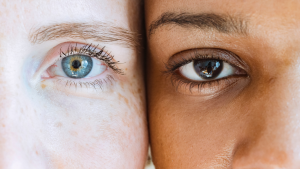-
See the Difference: Save $1,000 on LASIK , Find More
*Must mention this promotion and be treated before April 30 of 2025 to qualify. $1,000 off for both eyes on standard Wavelight price, $500 off for one eye. Cannot be combined with any other offers.
The Hidden Link Between Dehydration and Eye Health
In the realm of health and wellness, hydration is often emphasized for its numerous benefits, from promoting skin radiance to enhancing cognitive function. However, one aspect that is frequently overlooked is its profound impact on eye health. The eyes, often described as the windows to the soul, are intricate organs reliant on proper hydration for optimal function. In this article, we delve into the lesser-known connection between dehydration and its effects on the eyes, shedding light on why maintaining adequate hydration is crucial for preserving vision.
Understanding Dehydration:

Before exploring its effects on the eyes, it’s essential to grasp what dehydration entails. Dehydration occurs when the body loses more fluids than it takes in, leading to an imbalance that disrupts various physiological processes. Factors such as excessive sweating, inadequate fluid intake, and certain medical conditions can contribute to dehydration, leaving the body and its vital organs, including the eyes, vulnerable to adverse effects.
The Eyes

Complex and Vulnerable:
The eyes are marvels of biological engineering, comprising intricate structures that work in harmony to facilitate vision. Central to their function is maintaining proper hydration levels within various ocular tissues. The cornea, for instance, relies on a precise balance of moisture to remain transparent and refract light effectively. Likewise, the aqueous humor, a clear fluid filling the front portion of the eye, serves crucial roles in nourishing ocular tissues and maintaining intraocular pressure.
Effects of Dehydration on Vision:
When the body becomes dehydrated, it initiates a cascade of physiological responses aimed at conserving water. Unfortunately, these mechanisms can inadvertently impact ocular health and visual function. Here’s how dehydration manifests its effects on the eyes:
- Dry Eyes:
One of the most common manifestations of dehydration is dry eye syndrome. Inadequate hydration disrupts the tear film, a complex mixture of water, oils, and proteins that lubricates the ocular surface. As a result, individuals may experience symptoms such as itchiness, redness, and a gritty sensation in the eyes, impairing visual comfort and clarity. - Blurred Vision:
Dehydration can compromise the smooth functioning of ocular structures, leading to fluctuations in visual acuity. Without sufficient moisture, the cornea may become irregularly shaped, causing light to scatter instead of focusing sharply on the retina. This can result in blurred vision, especially during activities that require sustained focus, such as reading or using digital screens. - Increased Sensitivity to Light:
Adequate hydration helps maintain the transparency of ocular tissues, allowing light to pass through without distortion. In contrast, dehydration can cause these tissues to become dehydrated and less pliable, resulting in increased sensitivity to bright lights. Individuals may find themselves squinting or experiencing discomfort when exposed to sunlight or artificial lighting. - Eye Fatigue and Strain:
Prolonged periods of dehydration can exacerbate eye strain and fatigue, particularly in today’s digital age where screen time is ubiquitous. Insufficient hydration diminishes the eye’s ability to produce tears, leading to reduced lubrication and increased friction between the eyelids and the ocular surface. This can culminate in symptoms such as eye redness, soreness, and difficulty maintaining focus, making tasks like driving, or working on a computer more challenging.
Prevention and Management
Fortunately, the adverse effects of dehydration on the eyes can be mitigated through simple yet effective strategies:
- Stay Hydrated:
Make a conscious effort to drink an adequate amount of water throughout the day, aiming for at least eight glasses or more depending on individual needs and activity levels. - Blink Regularly:
Practice mindful blinking to keep the ocular surface moist and prevent dryness, especially during prolonged periods of screen use or in dry environments. - Use Lubricating Eye Drops:
Over-the-counter lubricating eye drops can provide temporary relief from dry eye symptoms by replenishing moisture and soothing irritation. - Take Breaks:
Incorporate regular breaks into your daily routine, particularly if engaged in tasks that require prolonged visual concentration. Use these breaks to rest your eyes, hydrate, and engage in relaxation techniques.
Conclusion:
In conclusion, dehydration poses significant risks to ocular health and visual function, underscoring the importance of maintaining optimal hydration levels. By understanding the effects of dehydration on the eyes and adopting proactive measures to promote hydration, individuals can safeguard their vision and enjoy optimal eye comfort and clarity. Remember, hydration is not just a matter of overall well-being—it’s also essential for keeping your eyesight sharp and vibrant.
YOU MIGHT ALSO LIKE...
VISION CENTERS NEAR ME
Enter your zip code, city, or a doctor name below to find a vision center.
Find out if LASIK is right for you
Congratulations!
Your vision issues can most likely be corrected with a LASIK procedure. Schedule a free consultation today.
Answer 5 simple questions to see if you are a candidate
What is your age group?
Do you wear...
With corrective lenses, do you have...
Have you ever been told that you have astigmatism?
Have you ever been told that you have dry eyes?
Request an Information Kit
Learn about your surgeon, the latest advanced technology, procedures, options and benefits, financing options, and what to expect from your LASIKPlus experience.









